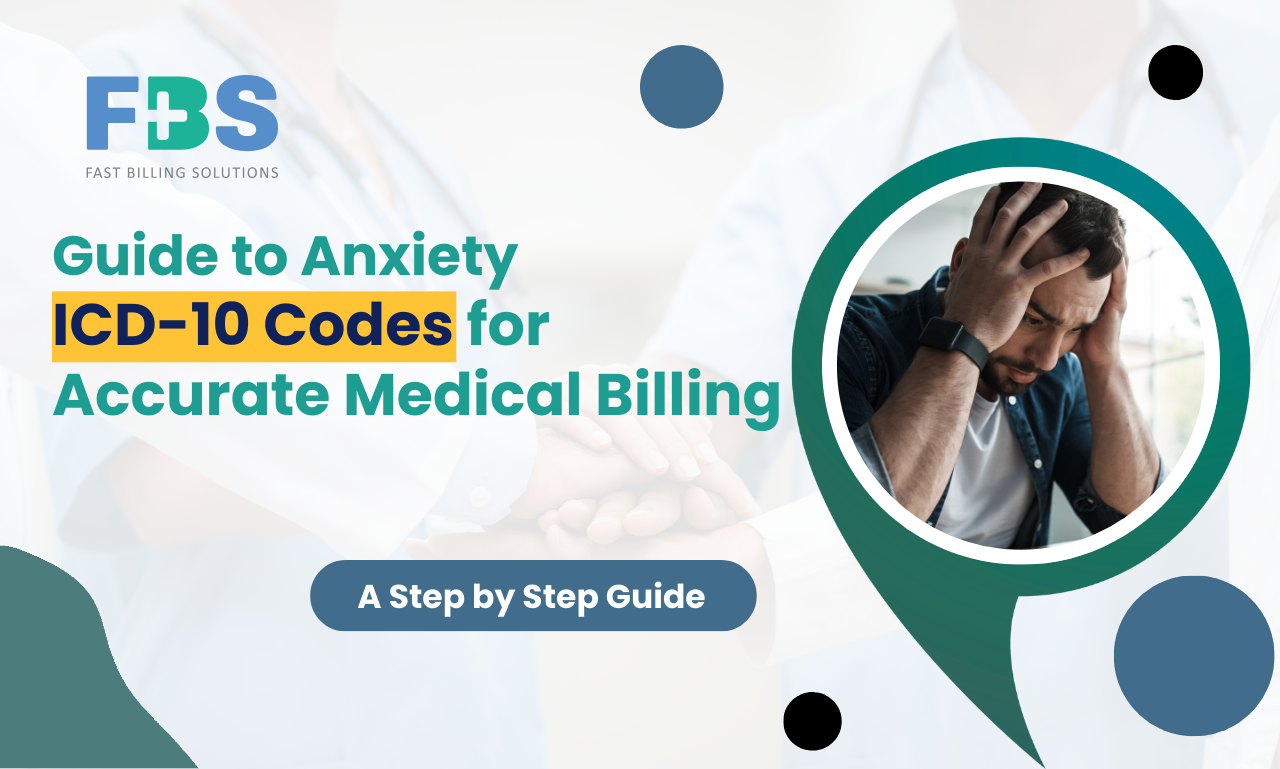
Anxiety disorders encompass a range of mental health conditions characterized by excessive fear, worry, and related behavioral disturbances. These disorders can significantly impact daily functioning and quality of life. Accurate classification and coding are crucial for effective treatment planning and insurance reimbursement.
Accurate medical coding is the backbone of efficient billing and reimbursement. For mental health professionals, understanding anxiety ICD-10 codes is critical to ensuring claims are processed smoothly and patients receive appropriate care. This guide dives deep into anxiety-related ICD-10 codes, their applications, and common pitfalls to avoid.
Understanding Anxiety Disorders and ICD-10 Coding
Anxiety disorders encompass a range of conditions, from generalized anxiety to phobias. The ICD-10 coding system categorizes these disorders under codes F40-F48 (Neurotic, stress-related, and somatoform disorders). Specificity is key—using the correct ICD-10 code for anxiety ensures compliance, reduces claim denials, and supports patient care.
Common Anxiety ICD-10 Codes and Their Applications
Below are the most frequently used anxiety disorder ICD-10 codes, along with clinical scenarios:
1. Generalized Anxiety Disorder ICD-10 (F41.1)
- Description: Excessive worry lasting ≥6 months, accompanied by physical symptoms (e.g., fatigue, restlessness).
- When to Use: Assign F41.1 for chronic, non-specific anxiety.
- Keywords: generalized anxiety disorder icd 10, icd 10 code for generalized anxiety disorder, icd 10 generalized anxiety.
2. Social Anxiety Disorder ICD-10 (F40.10)
- Description: Fear of social situations or scrutiny.
- When to Use: Code F40.10 for unspecified social phobia. Use F40.11 for generalized social anxiety.
- Keywords: social anxiety disorder icd 10, icd 10 anxiety disorder.
3. Adjustment Disorder with Anxiety ICD-10 (F43.22)
- Description: Anxiety triggered by a specific stressor (e.g., job loss, divorce).
- When to Use: Apply F43.22 when anxiety arises within 3 months of a stressful event.
- Keywords: adjustment disorder with anxiety icd 10, icd 10 code for anxiety disorder.
4. Unspecified Anxiety Disorder ICD-10 (F41.9)
- Description: Anxiety symptoms lacking specificity for a precise diagnosis.
- When to Use: Reserve F41.9 when documentation is insufficient.
- Keywords: anxiety unspecified icd 10, icd 10 anxiety unspecified, anxiety disorder unspecified icd 10.
5. Mixed Anxiety and Depressive Disorder ICD-10 (F41.2)
- Description: Co-occurring anxiety and depression without a dominant condition.
- When to Use: Assign F41.2 when both are equally prominent. If diagnosed separately, use F32.x (depression) + F41.x (anxiety).
- Keywords: mixed anxiety and depressive disorder icd 10, icd 10 code for anxiety and depression, depression anxiety icd 10.
6. Anxiety About a Medical Procedure (Z71.1 + F41.8)
- Description: Pre-procedural anxiety.
- When to Use: Pair Z71.1 (encounter for counseling) with F41.8 (other specified anxiety) or R45.81 (anxiety about health).
- Keywords: anxiety about procedure icd 10, icd 10 code for general anxiety.
Coding for Comorbid Conditions: Anxiety and Depression
When depression with anxiety is documented, coders have two options:
- F41.2 (Mixed Anxiety and Depressive Disorder): Use if symptoms are intertwined.
- Separate Codes (e.g., F32.9 + F41.9): Apply if each condition is independently diagnosed.
- Keywords: depression with anxiety icd 10, icd 10 code for depression with anxiety, anxiety and depression icd 10.
Avoiding Common Pitfalls in Anxiety ICD-10 Coding
- Overusing Unspecified Codes: While F41.9 is necessary for incomplete documentation, specificity (e.g., F41.1) minimizes denials.
- Ignoring Documentation Gaps: Collaborate with providers to clarify diagnoses.
- Miscoding Comorbidities: Distinguish between mixed disorders (F41.2) and separate diagnoses.
The Importance of Accurate ICD-10 Coding for Anxiety Disorders
Properly assigning ICD-10 codes to anxiety disorders is essential for multiple reasons, as it ensures effective treatment, proper insurance processing, and valuable data collection for public health analysis. Below are the key reasons why accurate coding is crucial:
1. Facilitating Effective Treatment Planning
Each anxiety disorder has unique symptoms and treatment approaches. When a healthcare provider assigns the correct ICD-10 code, it helps in developing a targeted treatment plan that aligns with the patient’s specific condition. For example, the management of generalized anxiety disorder (F41.1) may involve long-term therapy and medication, whereas adjustment disorder with anxiety (F43.22) might require short-term counseling and stress management techniques. Accurate coding ensures that patients receive the most appropriate care for their condition.
2. Ensuring Proper Insurance Reimbursement
Medical billing and insurance claims rely heavily on precise ICD-10 coding. When healthcare providers submit claims with the correct ICD-10 code for anxiety disorders, insurance companies can accurately process reimbursements for consultations, therapy sessions, medications, and other treatments. Incorrect or vague coding can lead to claim denials, delayed payments, or even financial burdens for patients. Using specific codes, such as ICD-10 F41.9 for unspecified anxiety disorder, ensures that the insurance provider correctly categorizes and covers the treatment.
3. Supporting Public Health and Research
Accurate coding contributes to national and global health databases, allowing researchers and policymakers to track trends in anxiety disorders over time. When healthcare facilities report cases using standardized ICD-10 codes, public health agencies can assess the prevalence of disorders like social anxiety disorder (F40.1) or panic disorder (F41.0). This data helps in resource allocation, mental health program development, and policy-making to address growing mental health concerns.
Conclusion
Mastering anxiety ICD-10 codes—from generalized anxiety disorder icd 10 (F41.1) to social anxiety disorder icd 10 (F40.10) ensures accurate billing and optimal patient outcomes. At Fast Billing Solutions, we emphasize ongoing coder education and collaboration with healthcare providers to navigate the complexities of mental health coding.
By prioritizing specificity and staying updated on ICD-10 guidelines, your practice can reduce claim rejections and enhance revenue cycle efficiency.
Need help streamlining your billing process? Contact Fast Billing Solutions today!

